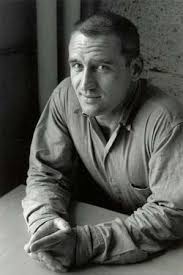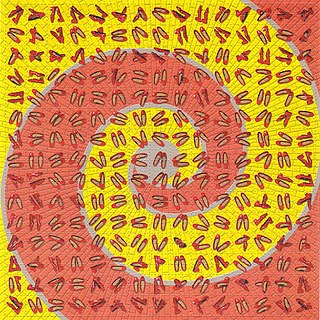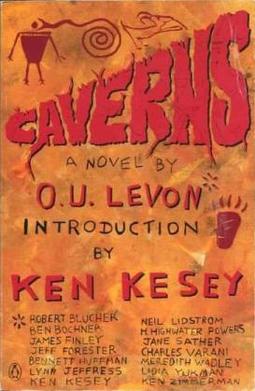
Ken Elton Kesey was an American novelist, essayist and countercultural figure. He considered himself a link between the Beat Generation of the 1950s and the hippies of the 1960s.

Neal Leon Cassady was a major figure of the Beat Generation of the 1950s and the psychedelic and counterculture movements of the 1960s.
The Merry Pranksters were followers of American author Ken Kesey. Kesey and the Merry Pranksters lived communally at Kesey's homes in California and Oregon, and are noted for the sociological significance of a lengthy road trip they took in the summer of 1964, traveling across the United States in a psychedelic painted school bus called Furthur, organizing parties, and giving out LSD. During this time they met many of the guiding lights of the 1960s cultural movement and presaged what are commonly thought of as hippies with odd behavior, tie-dyed and red, white, and blue clothing, and renunciation of normal society, which they dubbed The Establishment. Tom Wolfe chronicled their early escapades in his 1968 book The Electric Kool-Aid Acid Test, and documents a 1966 trip on Furthur from Mexico through Houston, stopping to visit Kesey's friend the novelist Larry McMurtry. Kesey was in flight from a drug charge at the time.

Furthur is a 1939 International Harvester school bus purchased by author Ken Kesey in 1964 to carry his "Merry Band of Pranksters" cross-country, filming their counterculture adventures as they went. The bus featured prominently in Tom Wolfe's 1968 book The Electric Kool-Aid Acid Test but, due to the chaos of the trip and editing difficulties, footage of the journey was not released as a film until the 2011 documentary Magic Trip.

The psychedelic drug lysergic acid diethylamide (LSD) was first synthesized on November 16, 1938, by the Swiss chemist Albert Hofmann in the Sandoz laboratories in Basel, Switzerland. It was not until five years later on April 19, 1943, that the psychedelic properties were found. Today, the discovery of LSD is celebrated worldwide during the annual Bicycle Day holiday, serving also as the day celebrating the psychedelic revolution in general.
Ken Babbs is a famous Merry Prankster who became one of the psychedelic leaders of the 1960s. He along with best friend and Prankster leader, Ken Kesey, wrote the book Last Go Round. Babbs is best known for his participation in the Acid Tests and on the bus Furthur.

Dog Soldiers is a novel by Robert Stone, published by Houghton Mifflin in 1974. The story features American journalist John Converse, a Vietnam correspondent during the war, Merchant Marine sailor Ray Hicks, Converse's wife Marge, and their involvement in a heroin deal gone bad. It shared the 1975 U.S. National Book Award for Fiction with The Hair of Harold Roux by Thomas Williams. Dog Soldiers was named by Time magazine one of the 100 best English-language novels, 1923 to 2005.
David Kahne is an American record producer, musician, composer, and former record company executive.

Who'll Stop the Rain is a 1978 American crime war film directed by Karel Reisz and starring Nick Nolte, Tuesday Weld, Michael Moriarty, and Anthony Zerbe. It was released by United Artists and produced by Herb Jaffe and Gabriel Katzka with Sheldon Schrager and Roger Spottiswoode as executive producers. The screenplay was by Judith Rascoe and Robert Stone, based on Stone's novel Dog Soldiers (1974), the music score by Laurence Rosenthal, and the cinematography by Richard H. Kline. The movie was entered in the 1978 Cannes Film Festival.

Sailor Song is a 1992 novel written by Ken Kesey. The only work of long fiction solely written by Kesey after Sometimes a Great Notion (1964), Sailor Song depicts the lives of the residents of Kuinak, a small town in Alaska, thirty years in the future – the 2020s.
Robert K. Elder is an American journalist, author, and film columnist. He is currently the President and CEO of the Outrider Foundation. He has written more than a dozen books on topics ranging from the death penalty and movies to Ernest Hemingway and Elvis Presley.
Edward Poage McClanahan was an American novelist, essayist, and professor.
Garage Sale may refer to:

Sometimes a Great Notion is the second novel by American author Ken Kesey, published in 1964. While One Flew Over the Cuckoo's Nest (1962) is more famous, many critics consider Sometimes a Great Notion Kesey's magnum opus. The story involves an Oregon family of gyppo loggers who cut trees for a local mill in opposition to unionized workers who are on strike.
Paul M. Foster was a Merry Prankster best known for illustrating the book Kesey's Garage Sale. He was a founding member of Wavy Gravy's Hog Farm commune.

The Acid Tests were a series of parties held by author Ken Kesey primarily in the San Francisco Bay Area during the mid-1960s, centered on the use of and advocacy for the psychedelic drug LSD, commonly known as "acid". LSD was not made illegal in California until October 6, 1966.

Caverns is a 1989 novel written collaboratively as an experiment by Ken Kesey and a creative writing class that he taught at the University of Oregon. The cover of the book says it was written by O.U. Levon—the name of this supposed author, spelled backwards, is "novel U.O.". The full list of authors is: Robert Blucher, Ben Bochner, James Finley, Jeff Forester, Bennett Huffman, Lynn Jeffress, Ken Kesey, Neil Lidstrom, H. Highwater Powers, Jane Sather, Charles Varani, Meredith Wadley, Lidia Yukman and Ken Zimmerman.

Randle Patrick "Mac" McMurphy is the protagonist of Ken Kesey's novel One Flew Over the Cuckoo's Nest (1962). He appears in the stage and film adaptations of the novel as well. Jack Nicholson portrayed Randle Patrick McMurphy in the 1975 film adaptation, earning him an Academy Award for Best Actor. He was nominated on the "Heroes" list of AFI's 100 Years...100 Heroes & Villains, but did not make the final list. In 2019 he was ranked by film magazine Empire as the 99th Greatest Movie Character of All Time.
Lee Quarnstrom was an American journalist, executive editor of Larry Flynt’s Hustler Magazine, and a Beatnik. He was a core member of the Merry Band of Pranksters, a group loosely led by novelist Ken Kesey.

The Storyteller, also known as the Ken Kesey Memorial, is an outdoor bronze sculpture by Pete Helzer, installed at Kesey Square in Eugene, Oregon, in the United States. Unveiled in 2003, it depicts American novelist, essayist, and countercultural figure Ken Kesey reading to his three grandchildren, Kate Smith, Caleb Kesey and Jordan Smith. Plaques on the base of the sculpture contain excerpts from Kesey's novels One Flew Over the Cuckoo's Nest (1962) and Sometimes a Great Notion (1964).












